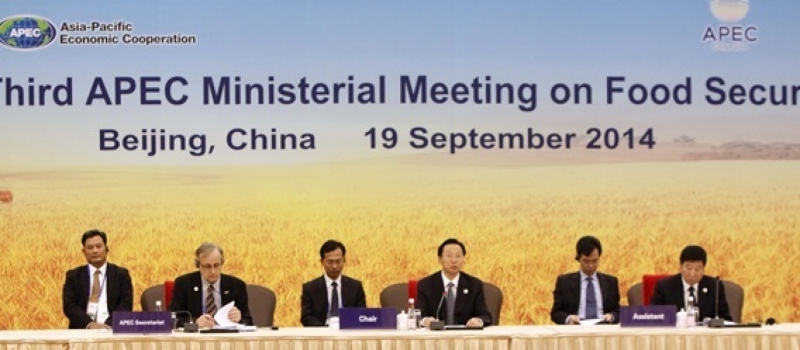



Agriculture remains the lifeblood even in modern societies. This is especially felt in most countries in Southeast Asia where agriculture is a key contributor to the countries’ GDP and one of the major sources of income of people in the countryside. The 21st century brings with it new challenges for those in the agriculture sector, most significant of which are the threats and impacts of the changing climate and unpredictable natural disasters. The UN's first Millennium Development Goal that seeks to address poverty and hunger in the world only further underscores the importance of national, regional and global food security efforts and initiatives.
Commitment to food security

The concluded 3rd Asia-Pacific Economic Cooperation (APEC) Ministerial Meeting on Food Security is a step further to reinforce the region’s commitment to food security and address the issue of global hunger. The event, which took place in Beijing, China in September 19, 2014 was attended by representatives from the Association of Southeast Asian Nations (ASEAN), the Pacific Economic Cooperation Council (PECC), the Pacific Islands Forum (PIF), and the APEC Business Advisory Council (ABAC), among others.
As expressed in the meeting’s Preamble, the group recognized the need to further strengthen inter-country and regional cooperation in terms of knowledge and technology sharing to achieve an “all-win partnership for long-term food security.”
The threats of climate change are real and agricultural communities and systems should be more resilient and adaptive in the face of these threats. The ministers stressed the role of governments in providing critical policies and facilitating capacity-building and disaster management measures to help small-scale farmers and agricultural workers counter the impacts of the changing climate.
There was also emphasis on the still continuing issue of post-harvest losses and food waste. In the face of scarcity and undernourishment in some parts of the world, reports from the Food and Agriculture Organisation (FAO) show that about one-third of the food in the world is wasted either in production and processing or retailing and consumption. Measures to reduce food wastage including technologies that will minimize post-harvest losses are needed.
Finally, the group reiterated the call for continued partnerships and cooperation among research institutes, innovation centers, and agricultural consortia in their research and development undertakings. Research efforts should continue to look into eco-friendly and culturally appropriate farming technologies and planting patterns that can raise productivity especially of small-scale producers.
Stronger partnerships and linkages
Earlier this year, a similar call for stronger partnerships in agriculture was made in the World Economic Forum on East Asia last May 21 – 23, 2014 in Manila, Philippines. The Southeast Asian region has the potential to lead sustainable agricultural production in Asia, according to Lisa Dreier, Head of Food Security and Development Initiatives, World Forum USA. Stronger regional commitment is needed to raise the region’s agricultural performance.
This call for continued partnerships is particularly relevant in a region where farmers, especially household and small-scale producers are the most vulnerable to fluctuating market prices and demands. In some countries too like the Philippines, there is an observed declining interest among the younger generation to go into farming and agriculture. Such a trend, if it continues, could seriously endanger the agricultural sector and the food production industry in the coming years.
One of the notable highlights of the said forum was the launching of the Grow Asia initiative in partnership with the ASEAN Secretariat. Grow Asia is hoped to provide the platform that will strengthen regional cooperation in agriculture, build linkages and improve sharing of best practices and technologies to push forward “sustainable and inclusive agricultural development.”